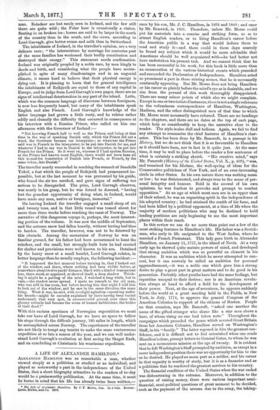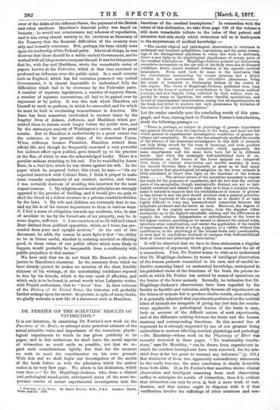A LIFE OF ALEXANDER HAMILTON.*
ALEXANDER HAMILTON was so remarkable a man, whether viewed simply as a politician or studied as an individual, and played so noteworthy a part in the independence of the United States, that a short biography attractive to the readers of to-day would be a: praiseworthy publication. At the same time, it must be borne in mind that his life has already twice been written,—
The We of Alexander Hamilton. By J. T. Morse, Jun. In 2 vols. Boston : little, Brown, and Ca 1876.
once by his son, Mr. J. C. Hamilton, in 1834 and 1840; and once by Mr. Renwick, in 1841. Therefore, unless Mr. Morse could put his materials into a concise and striking form, so as to attract English readers, or to bring Hamilton's career before the American public in a way that would induce them to read and study it—and there could in these days scarcely be found any subject which it would be more advisable that Americans should be well acquainted with—he had better not have undertaken his present task. And we cannot think that he has been successful in his work, for this book is little more than an enumeration of the various historical events which preceded and succeeded the Declaration of Independence. Hamilton acted so prominent a part in these stirring scenes, that he is necessarily continually appearing. But Mr. Morse does not bring Hamilton or his career so plainly before the mind's eye as is desirable, and we rise from the perusal of this work thoroughly disappointed. There are many minor points of which also we might complain. Except in one or two isolated instances, there is not a single reference to the voluminous correspondence of Hamilton, Washington, Madison, and the other distinguished men of that time to which Mr. Morse must necessarily have referred. There are no headings- to the chapters, and there are no dates at the top of each page, which help so considerably to keep the narrative clear to the reader. The style is also dull and tedious. Again, we fail to find any attempt to summarise the chief features of Hamilton's char- acter. This has been done by Mr. Bancroft, in a passage in his History, but we do not think that it is so favourable to Hamilton as it should have been, nor in fact is it quite just. At the same time, it may be well to place before the reader a few sentences of what is certainly a striking sketch. "His creative mind," says Mr. Bancroft (History of the United States, Vol. X., p. 409), "was, and remained for his lifetime, the well-spring of ideas for the Conservative politicians of New York, and of an ever-increasing circle in other States. In his own nature there was nothing mean or low ; he was disinterested, and always true to the sense of per- sonal integrity and honour. Bold in the avowal of his own opinions, he was fearless to provoke and prompt to combat opposition." At an age at which most men are in an upper class of their school, he was an organising spirit in the independence of his adopted country ; he had attained the zenith of his fame, and had been killed by a political opponent, at a time of life when the majority of modern politicians who may be destined to hold leading positions are only beginning to see the most important places within their reach.
In this review we can do no more than point out a few of the most striking features in Hamilton's life. His father was a Scotch- man, who early in life emigrated to the West Indies, where he married a French Protestant. This lady gave birth to Alexander Hamilton, on January 11, 1757, in the bland of Nevis. At a very early age he showed quite mature powers of mind, and developed that strong ambition which was so powerful an element in his- character. It was an ambition which he never attempted to con- ceal, but it can scarcely be called an ambition for personal aggrandisement,—it was a noble one which gave him a strong- desire to play a great part in great matters and to do good in his generation. Probably other youths have had the same feelings, but capacities unequal to their desires ; nor is an American revolu- tion always at hand to afford a field for the development of their power. Next, at the age of seventeen, he appears suddenly before the world at a great meeting held in the Fields, in New York, in July, 1774, to approve the general Congress of the American Colonies in support of the citizens of Boston. People on that occasion, says Mr. Bancroft, "asked one another the name of the gifted stranger who shone like a star seen above a haze, of whose rising no one had taken note." Throughout the campaigns which preceded the peace which severed Great Britain from her American Colonies, Hamilton served on Washington's Staff, in his "family." The latter reposed in him the greatest con- fidence, and it is difficult not to feel astonished when one reads Hamilton's clear, prompt letters to General Gates, to whom he was sent on a momentous mission at the age of twenty. It is evident that he left Washington's Staff prompted by ambition, as except in a more independent position there was no opportunity for him to rise as he desired. He played no mean part as a soldier, and his career in that capacity is worthy of study, but it is as a financier and as a politician that he rendered the greatest services to his country.
The financial condition of the United States when the war ended was disheartening in the extreme. Moreover, in addition to the question of raising money, there were various important semi- financial, semi-political questions of great moment to be decided, such as the payment of the arrears due to the army, the taking-. over of the debts of the different States, the payment of the British and other creditors. Hamilton's financial policy was based on honesty ; be would not countenance any schemes of repudiation, and it was owing almost entirely to his exertions as Secretary of the Treasury that the financial difficulties of the country were ably and honestly overcome. But, perhaps, his fame chiefly rests upon his leadership of the Federal party. Above all things, he was desirous that there should be a stable central Government, and he worked with all his powers to compass hia end. It was for this purpose that he, with Jay and Maddison, wrote the remarkable series of papers known as the Federalist, which at that time exercised so profound an influence over the public mind. In a small country such as England, which has for centuries possessed one central Government, it is almost impossible to understand fully the difficulties which had to be overcome by the Federalist party. A number of separate legislatures, a number of separate States, a number of separate conventions, all had to be gained over by argument or by policy. It was this task which Hamilton set himself to work to perform, in which he succeeded, and for which he must be held in everlasting remembrance in America. His fame has been somewhat overlooked in modern times by the lengthy lives of Adams, Jefferson, and Maddison which per- mitted them to remain much longer before the public view, and by the statuesque majesty of Washington's career, and its great results. But to Hamilton is undoubtedly to a great extent due the existence in its present shape of the American Union. When Jefferson became President, Hamilton retired from official life, and though he frequently exercised a very powerful but indirect effect upon politics, gave himself up to his practice at the Bar, of which he was the acknowledged leader. There is a peculiar sadness attaching to his end. For he was killed by Aaron Barr, in a duel into which he was drawn against his will. In the paper which he prepared before this event, he says On my expected interview with Colonel Burr, I think it proper to make some remarks explanatory of my conduct, motives, and views. I was certainly desirous of avoiding this interview for the most cogent reasons. 1. My religious and moral principles are strongly opposed to the practice of duelling, and it would give me pain to shed the blood of a fellow-creature in a private combat forbidden by the laws. 2. My wife and children are extremely dear to me, and my life is of the utmost importance to them in various ways. 3. I feel a sense of obligation towards my creditors, who, in case of accident to me by the forced sale of my property, may be, in some degree, sufferers. 4. I am conscious of no ill-will to Colonel Burr distinct from political opposition, which, as I trust, has pro- ceeded from pure and upright motives." At the end of this document, he adds, the reason he must fight is that "the ability to be in future useful, whether in resisting mischief or effecting good, in those crises of our public affairs which seem likely to happen, would probably be inseparable from a conformity with public prejudices in this matter."
We have said that we do not think Mr. Bancroft quite does justice to Hamilton's character. In the summary from which we have already quoted he makes no mention of the clear, forcible richness of his writings, of the unhesitating confidence reposed in him by his friends, which is the sure mark of affection, and which only is to be found in actual words when Lafayette writes, with French enthusiasm, that he "loves" him. In later volumes of the History of the United States, the historian will probably further enlarge upon his career. At present, in spite of many faults, we gladly welcome a new life of a statesman such as Hamilton.



































 Previous page
Previous page